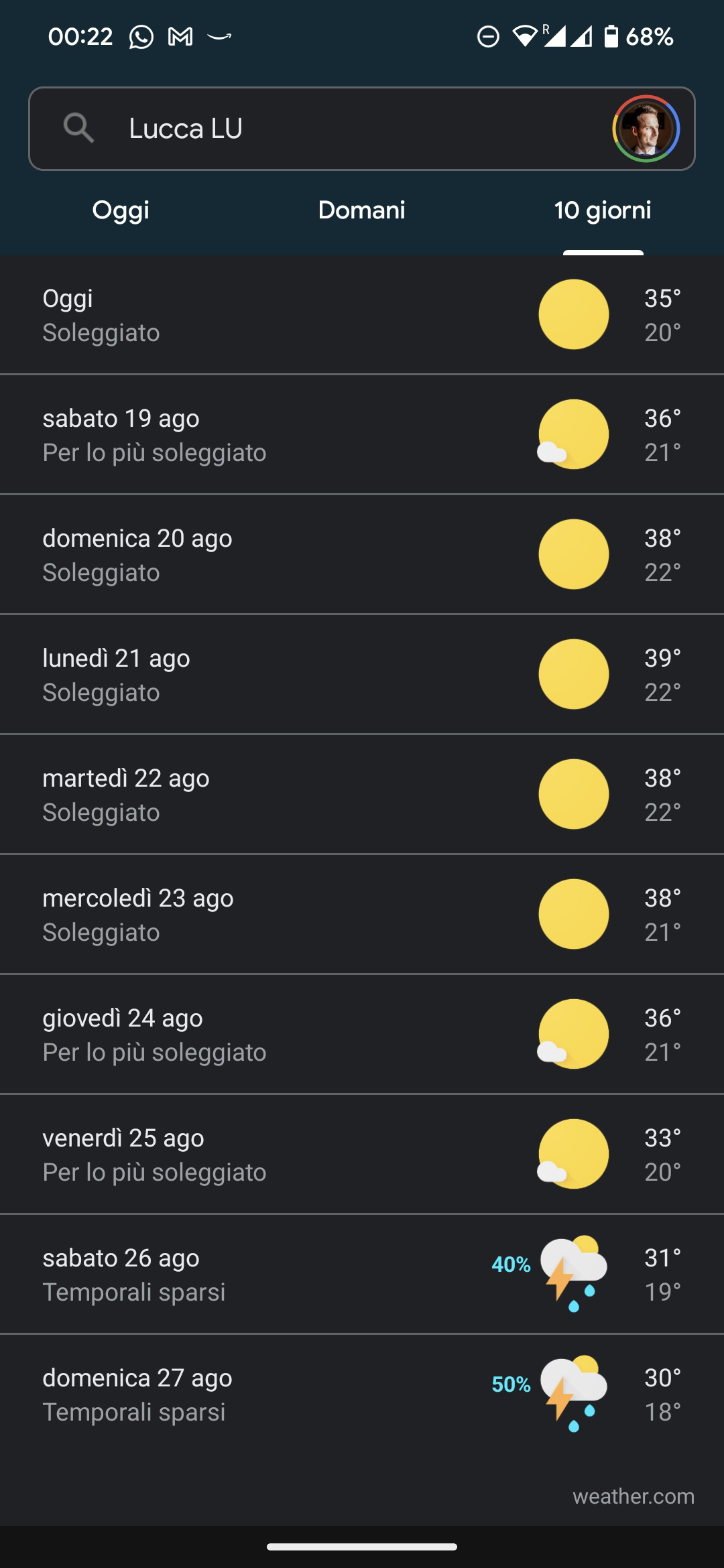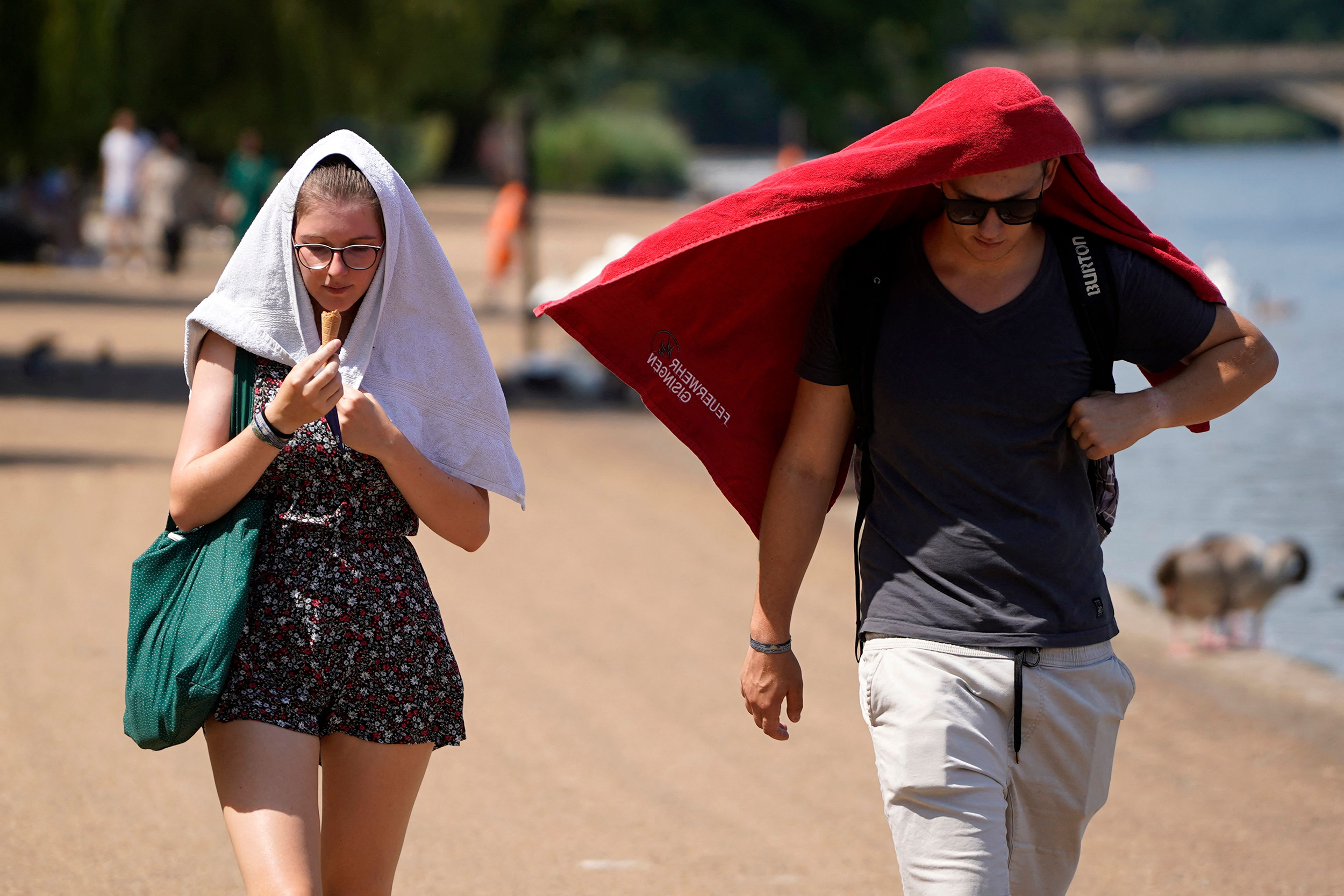Also most of Europe is significantly north of the USA so…yeah. Non-story.
Actually it’s mostly due to the construction materials and techniques used. American houses are generally less well insulated and built with the explicit expectation that there will be active air conditioning used to maintain the temperature.
Meanwhile in Europe this is not only comparatively very expensive to do, it is also largely unnecessary due to many buildings predating modern air conditioning, using good insulation and passive systems to maintain a comfortable temperature. There are also regulations on newly built houses that make it generally attractive to build energy efficient.
One thing I can promise you, even if it’s not 2x4 construction, those brick and plaster walls will turn a house into an oven over the summer even with judicious control of open windows. They just store up the heat for a night time that feels like noon day sun. Folks used to straight up sleep on their porches.
Signed,
A resident of an un-air conditioned brick and plaster house in the mid Atlantic currently sweating his balls offThat’s been a problem with climate change in the UK where air conditioning doesn’t really exist but we are starting to experience warmer weather than the houses were built for.
Most British houses don’t have any insulation, that’s why they suck. Try a new build and feel the difference.
Can confirm, so long as you have cool nights and insulated houses you don’t strictly need ACs, you can get by with opening all the windows at night and closing them (and closing the curtains) during the day so the cold is trapped inside.
I live in a new build and my biggest heating bill this winter was about above £60. I only have portable air con because I WFH and my giant 4K monitors heat up to +46 and just blast that heat into my face all day long. That’s awesome during the winter as I don’t have to heat my work room at all, but during the hottest days it becomes a problem. Other parts of the home don’t need air con at all. Was OK even during last year’s heatwave.
I have a new build but it doesn’t allow the heat to escape on the heat we’ve experienced during the last couple of summers (this summer excluded).
Do you even understand how to protect your home from the heat? When it’s hot outside, your insulation protects you from the hear outside. But there’s a weak link - your windows. You MUST cover them completely during the day. And also you MUST keep ALL windows closed during the day. That will keep your home cool. Then during the night when the temperature drops, you should open your windows for ventilation and cooling.
Source?
There isn’t one. The latitude isn’t the only reason either; the jet stream over the Atlantic moderates the European climate. Meanwhile in places like Minnesota and Buffalo you oscillate between -30°F with 48” of snow in 24 hours in January to 100°F with 90% relative humidity in August. If construction were poor and insulation was substandard, people would die.
Most of Europe doesn’t have a/c for the same reason a lot of Seattle and SF don’t — it’s never been necessary.
The North American Insulation Manufacturers Association (NAIMA) reported that approximately 90% of U.S. single-family homes are under-insulated and are wasting energy and money
European houses are typically built with masonry, while North American houses are usually made of wood.
http://masonrydesign.blogspot.com/2014/01/european-construction-versus-north.html?m=1
Then there are some design choice difference that also matters. In the US average ceiling height is around 9 foot. In Europe it’s 11. Open floor plans are more common in the US. It’s a trend coming to Europe but given the average age of a house in Europe it’s still relatively rare.
Yes, the USA has plenty of well built houses. No one is arguing against this. And the climate plays a bigger part why most of Europe doesn’t have AC. But the statement is still true. European homes are generally built without taking an AC into consideration and are trying to fix the issues in a passive way because of it.
The USA aren’t the worst offender either. Australia has it way worse. They have some of the worst insulation and are melting during summer and freezing during winter. Despite spending an ungodly amount on cooling and heating.
I recently got all new insulation, central ac, ducts. Just getting new insulation helpped a lot but I dont how much is enough. The company just showed a chart and said this how mich is standard here. Yes it is an american home yes it is brick.
Hmm, my apartment building is mostly cinderblock and concrete, I have 12 foot ceilings, I’m on the first (above the entry) of five floors so hot air should rise away, and I have good double glazing with UV blocking film and screens. But mid-afternoon when that low-latitude Southern California sun hits, and the Santa Anas are blowing off the desert, even closing all the curtains and turning off appliances can’t keep it cool. So we set the AC for 77 and swelter until the sun goes behind the building across the street. And I make sure I get all the day’s cooking done in the morning so I’m not adding any heat. I’ve seen Europeans come and sunburn themselves because they think they know how long they can play in the sun but they haven’t met OUR sun. It’s just more direct.
It’s very very common in the Northeast to not have AC in spite of the wooden construction and lack of insulation. No one in my family from upstate NY has AC. The climate is the vast majority of the reason there’s more AC in the US.
American houses are generally less well insulated and built with the explicit expectation that there will be active air conditioning used to maintain the temperature.
Well, that’s just silly and shortsighted. A well-insulated house will maintain its temperature more efficiently and require less active temperature control.
So that sort of mindset seems pretty on point for 'murica.
So is Canada, but it has 64% of homes with air conditioning.
Also, maybe it’s just me, but like didn’t England, France, Spain, Italy and southern Germany all hit like 100f (38c) or higher this summer (and other summers before that)?
It’s less of a story and more a telling sign that climate change is having a direct impact on humans that it’s becoming more and more necessary for people in even European, Canadian and even PNW climates to adapt and outfit houses and businesses with them.
Southern Germany didn’t hit 38.
The main reason is how people build houses. In Europe, people use different meterials (bricks, mortar, concrete, etc.) which insulate and put on top insulation. Walls are thicker too. The good insulation keep the heat outside.
The other is the law. Europe has regulations on AC. For example, if I want AC in my house, I must compansate the electricy consumption with renewable.
Most of the American homes i have lived in are brick homes.
Not arguing about which is better but most American brick homes you see are a brick veneer, still renting on plywood, studs, and Sheetrock for the actual wall.
So what make a brick home a brick home
I think most people here are talking about the structure being provided by the brick/blocks. Typically they’re much thicker and heavier and provide structure and some insulation.
Well the American style would provide insulation. It is still bricks just with fiberglass insulation and other wall parts
You’re part right and part wrong:
While building with different materials DOES change insulation, that doesn’t mean it always makes the buildings cooler.
On the contrary, building with bricks, as is standard for all year residential buildings throughout most of Europe is a way to trap and detain heat, NOT a way to keep heat out.
You see, the greatest temperature difficulty before anthropogenic global was the outside being too COLD, so that’s what we’ve been building for and because of that, AC hasn’t been as necessary.
Nowadays though, the heat retaining structures with no AC are becoming unbearably hot for much of the year. We desperately need environmentally responsible AC.
That’s nonsense. Insulation works both ways. It doesn’t differentiate if outside is cold or hot. A well insulated house will keep you warm during winter and cool during summer.
My house is very wel insulated. It doesn’t take much energy to keep it at a nice temperature in winter.
In summer though, it can get very hot inside. The reason is that I have some fairly large, south facing windows. And once it’s hot inside, it’s very hard to cool it down again.
I should really invest in some blinds, preferably outside, to keep the sun out during hot days.
But the point is that insulation and keep heat in/out is not perfectly symmetrical.
Without outside blinds, the insulation doesn’t work. The windows work as a greenhouse effect and will quickly heat your house.
Then, the insulation will work keeping the heat inside.
I did mention that in Europe, we close our outside blinds during the day.
Well, your problem is the sun going through the windows. They completely defeat your house insulation. Yes, you need blinds, they help a lot. Preferably, outside mounted. Like in Southern Europe. If you cannot mount them outside, look for pleated blinds. They not only your room protect from the sun, but also work as an additional insulation layer. You can also close them during winter nights to save a bit of energy.
Mate, you might as well complain your house is too hot because you run the heating all summer. Your insulation is working fine, you’re just nerfing it by not keeping the sun out.
It has to be cold inside to begin with. Much of the US has night time lowes over 25 in the summer, with daily averages of 30. So a uncooled home will never be near that. Allg homes should be well insuladed, but just like it would be mad do hgae no heat in much of Europe, its similarity not realistic to have no cooling in much of the us.
https://weatherspark.com/y/8813/Average-Weather-in-Dallas-Texas-United-States-Year-Round
Ottawa is on the same latitude as Venice so it’s not like canada is very northly (though i know canada has a much more varied temperature range). That aside i think there are many reasons, like the southern countries are not as wealthy as US and theres a culture of using other methods to survive the heat such as building colors, not paving every cm^2 of land etc. And if we look at more northen Eu countries like where I live (sweden) the highest ever measured temp is 38c (100.4f). So anyone here who needs an AC for the few days when the temp is above 25c is a card carrying bitch.
The climate of Europe is a lot warmer than in America for the same latitude
Winters are warmer, summers not so much.
Is that really true?
I can’t speak for all of Europe, I just don’t know. But Northern Europe definitely has warmer summers than areas at a comparable latitude.
I live in a part of Sweden that’s at a comparable level of Siberia. I promise you our summers are much warmer.
Yes, I think you underestimate Siberian summers. Here are three places with (fairly) similar latitude and identical summer temperatures, but nearly 20°C difference in winter: https://weatherspark.com/compare/y/84156~146168~148978/Comparison-of-the-Average-Weather-in-Stockholm;-Gillam-Man.;-and-Surgut-International-Airport
Damn. Cool! Thank you, you do indeed seem to be correct!
Are you fucking high?!? 38° is a hot summer day in Europe. Thats 100.4° F. When I lived there I hated life. Mosquitoes outside my window without a screen, so a breeze was out of the question. No A/C inside so breathing was also out of the question. I eventually found reprieve in the form of a 5” fan sold to me by an old man.
Point is, celsius or fahrenheit, its fucking hot
wait until you learn about the gulf stream
you basically have to move Houston to Madrid for temperatures to be comparable by latitude
wait until you learn about the gulf stream
nothing we’re not about to remove from the calculation
Climate change is a thing and it won’t matter how far north you are, the heat’s going to kill you.
Get some damn air conditioning.
Everyone having AC is a good way of accelerating climate change
It’s preferrable to heat stroke
deleted by creator
And will only get more expensive.
Because for most of Europe, it wasn’t needed to have AC up until more recent years. You would have maybe what? 5-10 days a year that were actually really warm. People wouldn’t install an AC for that.
These numbers will drastically change the coming decades.
These numbers will drastically change the coming decades
which will only make things worse, since AC just moves all the heat from indoors, out, and uses energy to work of course.
What we really need is builders to start taking the extra heat in to account and designing accordingly (there are loads of different ways to physically control the temperature of a space instead of mechanically).
Shame that’ll never actually happen…Can you elaborate on that? European housing is built with a lot of focus on insulation and heat control, what are you referring to?
European housing is built with a lot of focus on insulation and heat control
It’s more about also keeping heat out, as well as heat in. Which have overlap but are not necessarily the same thing. See this conversation for some more details.
Buildings with all glass façades are an insulation nightmare. Cities need more water, plants and trees. Houses need can be built to favour shadow and fressness. You can even go anciant design that were naturally cooled and winded, like roman or African houses.
I don’t know about other European countries, but France housing is a disaster the last 40 years. It’s only been a decade at best that insulation is a consideration, but the quality is quite bad.
The big change that needs to happen soon is passive heat blocking for personal residences.
Most HOAs don’t allow a big extra wooden structure over the roof to block the sun; but they’re going to need to start to keep home prices up.
But HOAs are designed to make rule changes almost impossible. So I predict we’re going to see a lot of expensive neighborhoods become cheap ones in the next 15 years, due to their HOA not fkexing to support necessary heat control structures.
This is a hairbrained idea. Nobody is seriously considering building massive wooden structures over entire home just for shade. Just focus on cool roofs, solar panels, trees, and usual weatherization.
If the temperature stops going up every year, you’re absolutely right.
Big if, right now
Overall it’s still going to be a net saving as people switch from electric/gas heat to heat pumps and AC is just those but running in reverse.
And, of course, insulation. The reason we got away without AC is due to generally very large thermal mass of the exterior, you shutter everything in the morning to keep the heat out and when the temperatures drop again you open everything and let the air cool everything down. Thing is: In those recent waves there were plenty of nights where the temperature didn’t really drop.
That’s not true. While Northern Europe doesn’t really need aircon, Southern Europe is pretty bloody hot since the days of Christ. The difference is that European houses are built with insulation in mind, US houses are built from sticks and shit.
The insulation requirements in the US are higher than many European areas with similar climates. Germany for instance would fall in region 4 and 5 of the US climate wise. R-30 is required for walls, R60 for ceilings, and R20 for floors for homes in the US. Germany recommends 6cm of wall insulation ~R8, 14cm for ceiling ~R19, and 6cm for the floor R8.
___You know if you muppets used sane units you’d be right. But you’re using colonial measurements.
Here’s conversion table. US R30 is equivalent to proper units R5.3, R60 is R10.5.
…and we don’t really have recommendations as such. KfW55 is nowadays mandatory for new construction, KfW70 and up gets you cheap loans. KfW70 means less than 45 kWh/m² per year for heating and they don’t really care how you achieve that. We didn’t really get around yet factoring cooling into stuff.
I was using freedom units for both. The R values were determined based on insulation thickness. Because you Europeans use energy consumption for your requirements it’s impossible to compare with US requirements. I did find this table giving recommendations for insulation.
Your numbers still don’t make any sense or are a century out of date or something.
The KfW also hands out loans to add insulation to existing buildings, U0.14 roof, 0.2 walls, 0.25 floor, so lowest R22.7 in Rankine land. The other numbers are for window, listed buildings, etc. All of that is minimum what’s actually recommended is well ask your architect and budget. There’s only so much that’s sensible to do when it comes to old construction as at some point hunting for air gaps and heat bridges is more bother than tearing the thing down and building new, and the KfW did set the standards sufficiently low so that currently uninsulated buildings at least get something and you can’t just tack on half a metre of insulation to an existing structure either. Mostly it’s the roof that’s missing insulation, walls tend to be defensible as they are and it probably makes more sense to upgrade the heating system.
You can back out R values based on insulation thickness, that table may be old… It didn’t have a date on it.
The values you provided equate to freedom R values of R40.5, R28, and R22.5 for the roof, walls, and floor. Those are inline or behind the US minimum requirements R60, R30, R20.
Not saying that is the case, but 20% of Europeans with A/C could also mean that 100% of the people in the very south have it and noone else.
You’re also wrong. Mainly, It has to do with the thermal capacity/mass of the building and not with differences in insulation values.
There are pros and cons for all building types.
I’m not wrong, sorry.
Wut? God, the worse from Reddit are already here…
US houses are insulated depending on their climate zone.
Southern Italy peaks at 32C and low humidity. That is absolutely nowhere close to the heat we get in much of the US.
US houses are most definitely built with insulation in mind. That point is somehow more laughable than you not knowing your own temps.
Literally every part of your claim is incorrect.
Southern Italy peaked at over 50° C this year, and do you really think a country completely surrounded by an ocean has low humidity?
Yes, comparatively.
Also I assure you no one is making building code choices based on one year.
Dude, I’m in Tuscany which is nowhere near the peaks of southern Italy.
This is what awaits me

This matches my expectations pretty well
Your houses would be built with the same materials if you had the earthquakes and tornadoes to deal with.
No.
I said most of Europe, not all of Europe.
I’m well aware that AC is common to have in the south but then you’re talking about like 4 countries. Once you move north of those, it’s not all that common to have an AC in the house.
Wut? No one is using AC.
Especially since some people are pushing for lower regulations on how to build houses in some countries in Europe. Yes, there is a housing crisis going on. But when we start to build weaker buildings because of that, we just make other problems worse.
Yes but not necessarily in the way you think
The US is also warmer on average compared to Europe. Because parts of the US are at the same latitude as Cario, Egypt.
The climate is definitely different. You are right overall. But some places like New York or Chicago are both hotter and colder depending on the time of year.
But some places like New York or Chicago are both hotter and colder
Than what? Chrisinau, Sevastopol and Bucharest are similar to New York
Hush now, don’t tell him about the gulf stream or maritime/continental climate. He might learn something.
Essentially, when summer hits, US is hotter than Europe. Canada has the same temperature in summer.
It’s not a conspiracy or some grand revelation.
They didn’t need it before. Much of America didn’t either. A lot of old wood houses had designs built for airflow and trees surrounding the houses. Those that didn’t got old attic fans that would pull air from the bottom of the house to the top and out of vents.
These days, insulation and HVAC exists and Americans jumped at the chance to have year round temperature control. Heat pumps now have the best efficiency for cooling and heating year round and can replace most options. Almost everyone will need this option as global warming barrell out of control.
I hate it when people chop down all of the trees around their house, I assume because they don’t want the leaves on their yard. I have a bunch of trees around my house, the downside is it is sort of dark in the house and it is hard to have a garden, the plus side is it must be at least 10 degrees cooler inside in the summer. I’ve left the house overdressed thinking it is a cool day because of it.
You’d have to have an extremely drafty house for them to pull air from the bottom of the house and your attic floor should be well insulated anyway. The recirculating air is coming from the soffits and vents. The best reason to have an attic fan is if you have an AC unit in the attic, then you want to get hot air out of that space.
If you live far from the cities, then cutting down the trees immediately close to your house can be a very reasonable thing to do (some countries even mandate it), because if a wildfire comes around, it is more likely your house will survive if it isn’t surrounded by flammable materials.
Tell me you live in California without telling me you live in California.
(Or maybe elsewhere in the west, or maybe Australia or something – the point is, it’s not a rural thing, it’s a rural + arid climate thing.)
Many non-arid Canadian provinces are on fire now. This guidance is given to anyone in a rural area in Vancouver, Alberta, Ontario, Quebec, and NWT.
In the last years the max temps during the summer months in southern Germany have significantly risen - often over 30 C. I just moved into a new house here that fulfills the latest energy efficiency standards (kfw55) and am surprised how well it also insulates against heat. With a recuperating air ventilation system it’s pretty bearable without active cooling.
I look after holiday properties in Europe, all new and highly insulated. I tell every guest to open their windows at night, then close everything they can during the day when they’re out. It’s how the locals have been doing it for centuries and it’s now far more effective. It’ll keep the cool air in the house as well as it keeps the heat in in winter
Tell this to 80% of guests, they have a lovely holiday
Tell it to Brits or yanks, they phone up 3 days later screeching like fuckin infants because their chalet is a boiling cauldron of flies because of course they knew better than some pesky local
Brits don’t know how to handle heat at all. We open all our windows during the day and let all the hot air in, and then complain about the house being too hot at night. We also like to open the windows on air conditioned trains and buses so we can complain about the air con not working.
It’s purely down the not understanding and not having to understand how to manage heat and that our houses are terribly insulated. We’re an island of clouds and rain.
Usually the people who live in good quality new-builds get it (Probably also cos they’re mortgaged up to the fuckin eyeballs and can’t afford to switch on the air con at home) 😂
Where i am right now it the middle of the night and 30c . not exactly letting a lot cool air in in those conditions
It’s almost as though different areas have different climates
Still wish I had EU citizenship. Imaging getting on a train and going anywhere you want.
My life so far:
- Be born in UK, be able to work / live anywhere in EU
- Emigrate to USA to try that for a bit (can always move back to anywhere in EU if I don’t like it!)
- Brexit
- Trump
And yes, I do miss the trains.
Yikes. Sorry for your misfortune
Ireland is still an option for UK citizens. If you have skills, nz, Australia or Canada are welcoming too.
It’s not all bad.
My mom was born and raised in the UK, came to the US in her mid 20s and never left. She went back a month ago to visit my grandparents, and she said that even though America is in a very bad place rn, the UK is a lot worse off. She said she even had a grieving period while she was there, and just let go of whatever UK pride / citizenship she had left. My cousins just moved from their to Canada, my aunt and uncle are moving to South Korea, and my grandparents are staying. They’re conservative/right wing and feel right at home and truly support Brexit and are racists.
I mean, if you are a us citizen you have free reign to take a painfully slow train to one of the three states that doesn’t suck.
Wait, the third state is currently on fire.
Make that two states.
Yup. Be careful not to derail because corporate overlords can’t even give railworkers 3 days off a year.
Not really true for a lot of Europe, but yes, it is a good thing.
Well, yes. Until people caused climate change, we didn’t need air cooling systems. Depending on where you lived, you need to build to keep heat IN buildings, even.
But, here we are, a planet on fire. So now we need air cooling to survive, lest our weakest, elderly, infirm, young children die. Then down the line once it’s even worse, it’ll be needed just so that any of us can survive.
Feck the bourgeoisie and the generations of apathetic fools under them that have allowed this to happen :-(
deleted by creator
Let’s see your efforts.
Exactly. It’s not the corporations, it’s us. Corporations are innocent and have no control over our decisions at all.
deleted by creator
Well, if you are going to call someone out, at least have a list of things you do.
Using some of the examples from my own life: I use public transit or bike. I don’t own a car. I grow vegetables in my yard. I make a conscious effort to recycle and reduce my waste. I saving to upgrade my heat from oil to much more sustainable technologies. I don’t use a powered tool where a manual will do, and if I have to use a powered tool I stay away from fuel powered ones.
Now, what are your efforts?
Spoiler: they’ve made none.
: individual efforts are ultimately useless. 100 companies cause 71% of all carbon emissions.
One cruise ship burns 7,000 gallons of fuel per hour. What are people living paycheck to paycheck supposed to do about that?
Those boats run 24/7, 365.
A Boeing 777 burns 8,500,000 millions of gallon of fuel per year. They’ve been around for 25 years. There are 1,700 in service. That’s like 300 billion gallons of fuel right there, one type of jet.
Man, when you’re in the high 90s, with humidity in the same numbers, it doesn’t matter how high your ceilings are, how much airflow you have under the house and through the attic, it sucks. And by sucks, I mean it can kill people sometimes.
Growing up here in the south, we didn’t have AC until somewhere in the late eighties, and that was a big window unit. Most days during the summer, you had no ability to do much of anything without suffering. After the window unit, we could at least eat dinner without being nauseous from heat.
This house didn’t have central air until 2003, when I put it in after I made a small bundle selling a book. I will never fucking go back to not having it. We keep it set fairly warm unless my wife is having trouble (MS fucks your ability to thermoregulate, and getting overheated can cause problems that can last weeks), but it simply isn’t realistic to do without it.
I have no clue what Europe is like in terms of summer weather patterns. But the south has these old houses like ours that are built to make the weather as livable as possible, and they don’t really succeed any more.
If I had the money, I’d likely switch to a heat pump, but I don’t, so oh well.
And that’s not even going into the extra expenses that come without AC of some kind. You get the heat and humidity going, and mold becomes a guarantee rather than a possibility. Wood warps, and stuff like plaster or drywall don’t exactly enjoy the humidity either.
Plenty of AC in Greece, per room split units not central.
Splits with heat pumps are more efficient anyway. The fancy ones with ceiling cassettes seem easier to install and maintain too, with zonal temp controls for even better efficiency.
Sure but most of them do not have heat pumps here.
You sure, because I’m pretty sure like 90% of AC in Europe is probably heat pumps because it doesn’t make sense for them not to be. It doesn’t change the cost at all, it functions the same like if you just used cooling.
I know at least that every AC I checked here in Croatia was a heat pump.
I was probably thinking of ground heat pumps.
Everyone has AC(often more than one), but noone has any money to pay for the electricity to use the AC. So many people dont use them or only use them for a couple of hours.
This is the main reason according to my European friends. The electricity cost is the issue.
For those that need a geography lesson to explain: https://vividmaps.com/comparing-latitude-of-europe-and-america/
And for those now suddenly wondering why Europe isn’t even colder than it actually is, the answer is that the Gulf Stream brings a lot of heat. Also, the reason why it hasn’t historically tended to get as hot as the American upper midwest/great plains during the summer is that the rest of the water surrounding it, such as the Med and the Baltic, helps moderate the temperature (as opposed to the “continental” climate of the midwest).
Two different climates too. USA is centred closer to the equater then all of Europe, which means more people live in year round heat, and want A/C to cool off.
Right? People forget this all the time and say “just open a window you baby” bitch it’s been 100+ (37c) every day for three months here, %50 humidity minimum. Our overnight lows are your daytime temps.
Even water temps in bays in FL have been pushing to 100F
As someone who struggled to sleep in sweat soaked sheets in a small hotel in France can they at least give you a fan?
Too dangerous. Could cause fan death
Korea has entered the chat
You could use a fan, sleep without a blanket or sleep hugging a water-filled water bottle. The latter two is what I generally do on warm days (or use a really thin sheet if it is not too warm). Also keep the windows open at night so the house can cool down before the sun rises and starts irradiating your walls and roof.
Very misleading title
The new analysis estimates a timescale for the collapse of between 2025 and 2095, with a central estimate of 2050
To be clear, this is still really bad, but it’s typical media reporting where scientists say sometime in the next 70 years and the media changes it to “next year”
I don’t disagree about the headline, but ~70 years for something that last happened in the ice age is imminent on a geologic scale. I mean, shit: that’s within my kid’s lifetime.
Oh yeah no for sure, we’re pretty much past the point of no return at this point for shitty things happening in my of our lifetimes, even if humanity decides to suddenly start doing something about it
On the other hand we weren’t supposed to hit +1.5° average before 2050, and here we are in 2023, unless a global scale event happens to cool the earth, we’ll hit this mark.
This year arctica never had this low ice cover. Same for antartica. Mountains are falling in Switzerland because of the lack of ice cover. It’s very bad and there might be cascading effects.
Gulf stream stopping could very well be happening in 2 years. It is a possibility. But even if it happens in 2050 it’s not really good you know.
If the gulf stream shuts down you’ll get your glaciers back and then some.
Oh great, and the climate will certainly not change one bit! /s
Shit.
Need to register to read further.
12ft.io is your friend
I’m sure the media will have a new and different apocalypse for us in a couple of months.
These comment threads could use some air conditioning!
Aren’t heat pumps a cleaner, better alternative to traditional AC?
Heat pumps ARE AC. Also your fridge.
And (multi-)split wall mounted ACs are among the most efficient heat pumps as well with SCOPs above 4.5. It’s frustratingly little-known or talked about (in central Europe anyway), because these devices would also be a much cheaper and more efficient heat-pump upgrade for older buildings that don’t have low temp supply-water heating and would normally need to be completely gutted to install floor heating or large radiators.
While being the cheapest, AC is also the type of heating with the least amount of comfort, while the most expensive solution, underfloor or wall heating is the best comfort. Radiant heat is much less intrusive than blowing air around violently.
That being said I think it also has its perks like the forced convection heats up a cold room much quicker and in a bathroom it assists drying surfaces or clothing on a drying rack (to stick with European customs). Meanwhile floor heating is extremely slow with some annoying side effects like it basically doesn’t react to noon sun shining into a room and heating it up or stuff like that.
But I’m not going to argue that comfort wise floor heating is far superior.
I agree. One thing I’d like to add: There are also low thermal mass floor heating systems available nowadays (usually dry, built on top of a layer of Insulation). These aren’t that slow to react. But of course, these bring not only advantages but also drawbacks.
You can install heat exchange unit. It will work as AC to cool you down and it will also heat your water and underfloor system. More advanced units can also be supplemented by gas/electricity when heat pump part is not effective (usually on very cold days).
Air Heat pumps are AC.
There are different types which uses earth or water body heat and are even more efficient but expensive.
Technology wise they are AC though
Yes. And many homes in Europe have them. US term for them are split AC systems.
A heat pump is just an air conditioner that works both ways (it can pump heat into or out of your house).
In the US, most people just buy air conditioners because natural gas furnaces cost less to operate than heat pumps.
The move to renewables and rooftop solar is making heat pumps more attractive than the conventional AC + furnace, but nothing about a heat pump is more efficient than an AC in the summer because they are fundamentally the same thing.
Where heat pumps are a big efficiency win is in places without natural gas. Assuming your winter weather doesn’t get too cold, pumping outside heat into your house uses substantially less electricity than resistive heating.
The technology behind them works exactly the same, only that usually the direction of heat transport is reversed. So at least the “cleaner” part depends largely on the chemicals used, not whether it’s an AC unit or a central heat pump.
Thanks everybody for your input 😉 Now I know the differences!
It wouldn’t surprise me if that changes over the next few years.
















